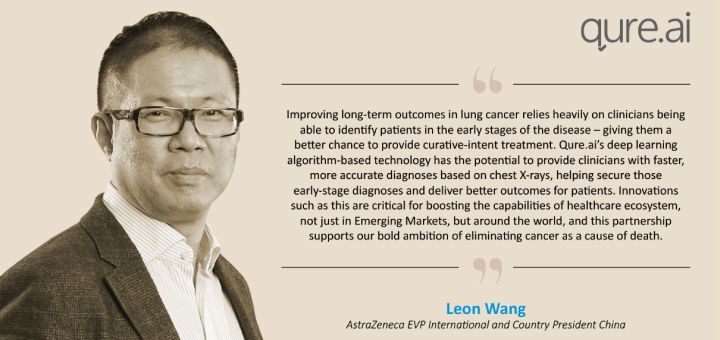Partnership between AstraZeneca’s Emerging Markets Health Innovation Hubs and Qure.ai demonstrates ongoing commitment to integrate innovative new technologies into the healthcare ecosystem of developing markets

Back
AstraZeneca has announced a partnership, through its Emerging Markets Health Innovation Hubs programme, with Qure.ai (developers of deep learning algorithms for the interpretation of radiology images) to integrate innovative artificial intelligence (AI) solutions for the early detection of lung cancer in patients across AstraZeneca’s Emerging Markets region, covering Latin America (Argentina, Brazil, Chile, Colombia, Costa Rica, Cuba, Dominican Republic and other Caribbean Islands, Ecuador, Guatemala, Honduras, Peru, Panama, Mexico, Nicaragua and Uruguay), Asia (Philippines, Malaysia and Thailand in 2020 and India, Indonesia and Vietnam in 2021) and the Middle East & Africa (Gulf Cooperation Council countries).
Globally, chest X-rays are the most commonly ordered diagnostic imaging test, with millions of scans performed every year.
Although chest X-rays are easily performed in primary care and referral settings, the interpretation of these X-rays requires significant skill and experience, and lack of expertise in reading the imaging can result in missed or delayed diagnosis.
A series of studies have described the use of deep learning algorithms to detect health markers, yielding promising results. ‘qXR’, Qure.ai’s chest X-ray interpretation tool, is able to automatically detect and localise up to 29 markers, including those indicative of possible lung cancer.
There are several features of chest radiographs (such as sharply circumscribed nodules or masses, those with irregular margins, and those with ill-defined lesions) that can indicate the presence of lung cancer.
The CE-marked qXR algorithm can not only detect lung cancer nodules with high levels of accuracy in under a minute, but also marks out the position and size of these nodules. It can aid clinicians in picking up minuscule nodules which may be missed even by experts.
A study conducted by Qure.ai demonstrated a 17% improvement in sensitivity when using AI to interpret chest X-rays, compared to radiologist readings. Such aids in early detection can have considerable long-term benefits for medical professionals in their efforts to tackle lung cancer. It can also mean lower cost per-life-year saved.
The AstraZeneca and Qure.ai partnership aims to harness and scale-up the use of this technology to improve early-stage detection of lung cancer in the markets involved, to reduce mortality rates and improve patient outcomes.
As part of the strategic collaboration, AstraZeneca’s Emerging Markets Health Innovation Hubs will work with Qure.ai to explore the application of deep learning algorithms to identify patients with suspicious radiographic lung markers and support their referral to arrive at a firm diagnosis.
The collaboration will also focus on overcoming barriers that limit access to diagnostic tools to support early lung cancer detection.
The end goal of the partnership is to improve referral and diagnostic pathways for patients with possible lung cancers and increase lung cancer detection at an earlier stage – improving the patient journey and ultimately reducing lung cancer mortality rates around the world.
Leon Wang, AstraZeneca EVP International and Country President China, said “Improving long-term outcomes in lung cancer relies heavily on clinicians being able to identify patients in the early stages of the disease – giving them a better chance to provide curative-intent treatment.
Qure.ai’s deep learning algorithm-based technology has the potential to provide clinicians with faster, more accurate diagnoses based on chest X-rays, helping secure those early-stage diagnoses and deliver better outcomes for patients. Innovations such as this are critical for boosting the capabilities of healthcare ecosystem, not just in Emerging Markets, but around the world, and this partnership supports our bold ambition of eliminating cancer as a cause of death.”
Prashant Warier, CEO and Co-Founder, Qure.ai, said “We are delighted to partner with AstraZeneca in the early detection of lung cancer using our AI solution for automated interpretation of chest X-rays. The software’s ability to process analogue and digital chest X-rays in a minute can help physicians in incidental diagnoses of lung cancer by pointing out small lung nodules which could have been missed in a cursory review. The solution also detects several other types of health markers from chest X-rays that are linked to infection, injuries and chronic diseases, and flags these to the physician, potentially creating other diagnostic pathways.”